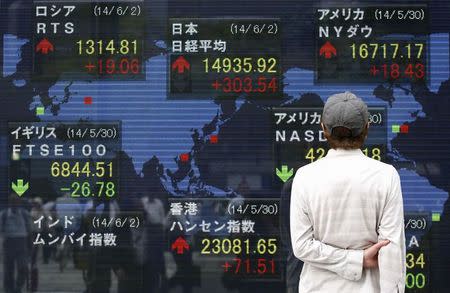Oil prices jump on Iraq anxiety, stocks fall

By Rodrigo Campos NEW YORK (Reuters) - Crude oil prices hit a nine-month high on Thursday on supply concerns and equities sold off as violence threatened stability in Iraq. Crude jumped after Iraqi Kurdish forces took control of the northern oil hub of Kirkuk, in the face of a triumphant Sunni Islamist rebel march towards Baghdad that threatens Iraq's future as a unified state. President Barack Obama did not rule out U.S. action against the militants. Brent crude futures rose 3 percent to $113.27 a barrel while U.S. crude added 2.2 percent to $106.71, the highest reading for both since September. The Thomson Reuters/Jefferies CRB index <.TRJCRB> rose 1.1 percent, the most in two months. "If this conflict knocked out Iraq as an exporter, that would have significant impact on prices," said Christopher Bellew, a trader at Jefferies Bache. Iraq is the second-largest OPEC producer. On Wall Street, stocks fell on caution over Iraq after drifting lower on weaker-than-forecast retail sales and an increase in first-time applications for unemployment benefits. [.N] Energy shares, however, were higher on the heels of the jump in oil prices. "It's a bit of a crisis mode here," said Timothy Ghriskey, chief investment officer at Solaris Asset Management LLC in New York. "Geopolitical concerns have definitely taken over. It's a very fluid situation and things are happening very fast, it seems." The Dow Jones industrial average <.DJI> fell 109.69 points or 0.65 percent, to 16,734.19, the S&P 500 <.SPX> lost 13.78 points or 0.71 percent, to 1,930.11 and the Nasdaq Composite <.IXIC> dropped 34.30 points or 0.79 percent, to 4,297.63. The FTSEurofirst 300 <.FTEU3> index of top European shares closed flat, just off the 6-1/2 year high of 1,398.65 hit earlier this week. A global stocks index from MSCI <.MIWD00000PUS> fell 0.3 percent. The New Zealand dollar jumped the most in four months to hit its highest since mid-May after the central bank raised interest rates and kept a hawkish bias. The kiwi surged 1.65 percent to $0.8691. The soft U.S. data, alongside growing geopolitical risk, dampened speculation of a more hawkish stance from the Federal Reserve, scheduled to meet next week. Fed Chair Janet Yellen was expected to be pressured on the timeline for rate hikes in a press conference on Wednesday. The euro is, however, set to post its fifth week of losses versus the dollar in the last six. The shared currency was recently up 0.2 percent at $1.3561. It earlier hit a low of $1.3510, near the low of $1.3503 hit last Thursday after the European Central Bank cut rates. In fixed income, the violence in Iraq drove investors into U.S. Treasuries that had inched up in price after the soft data. A robust auction of 30-year bonds also helped push prices higher as it eased concerns about fading demand for long-term U.S. government paper. [US/] U.S. 10-year notes were up 15/32 in price to yield 2.5861 percent, from 2.641 percent late on Wednesday. The 30-year bond rose 1-4/32 to yield 3.4084 percent. (Reporting by Rodrigo Campos, additional reporting by Angela Moon, Gertrude Chavez-Dreyfuss and Lorenzo Ligato; Editing by Nick Zieminski, Meredith Mazzilli and Chizu Nomiyama)
